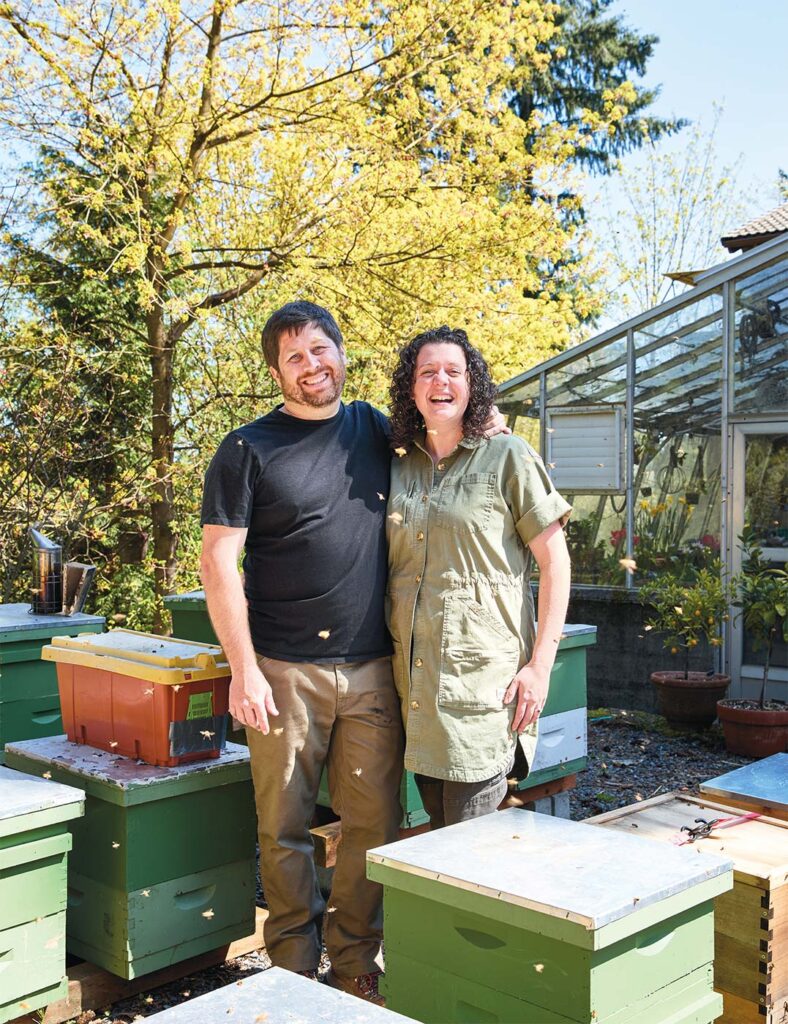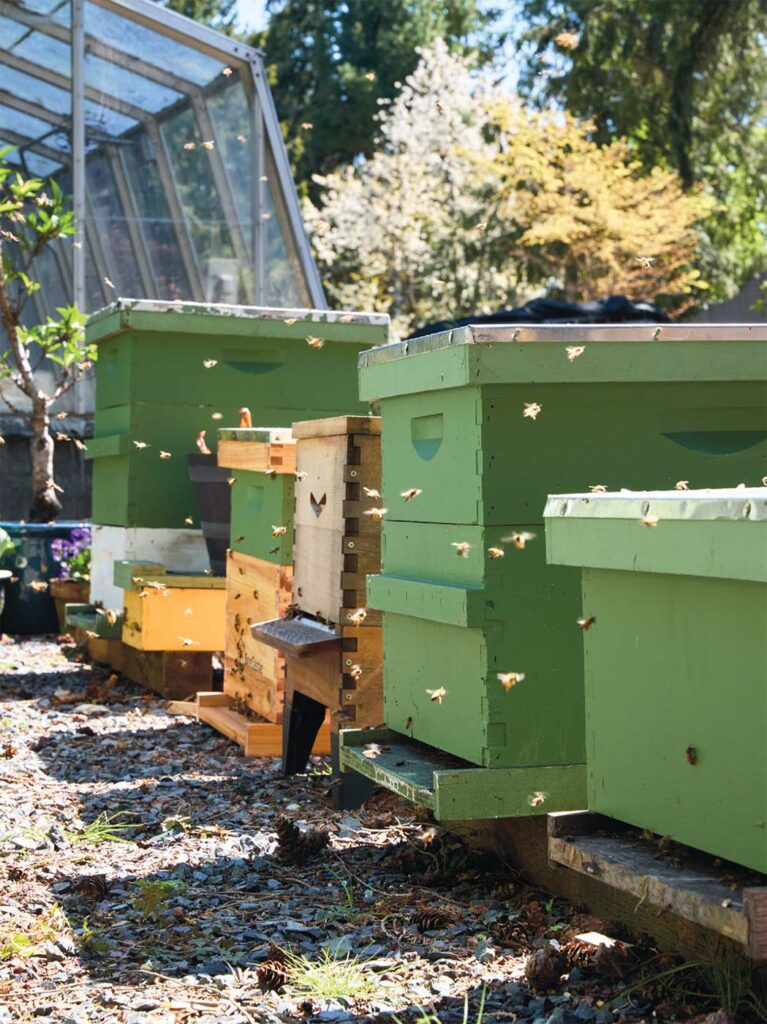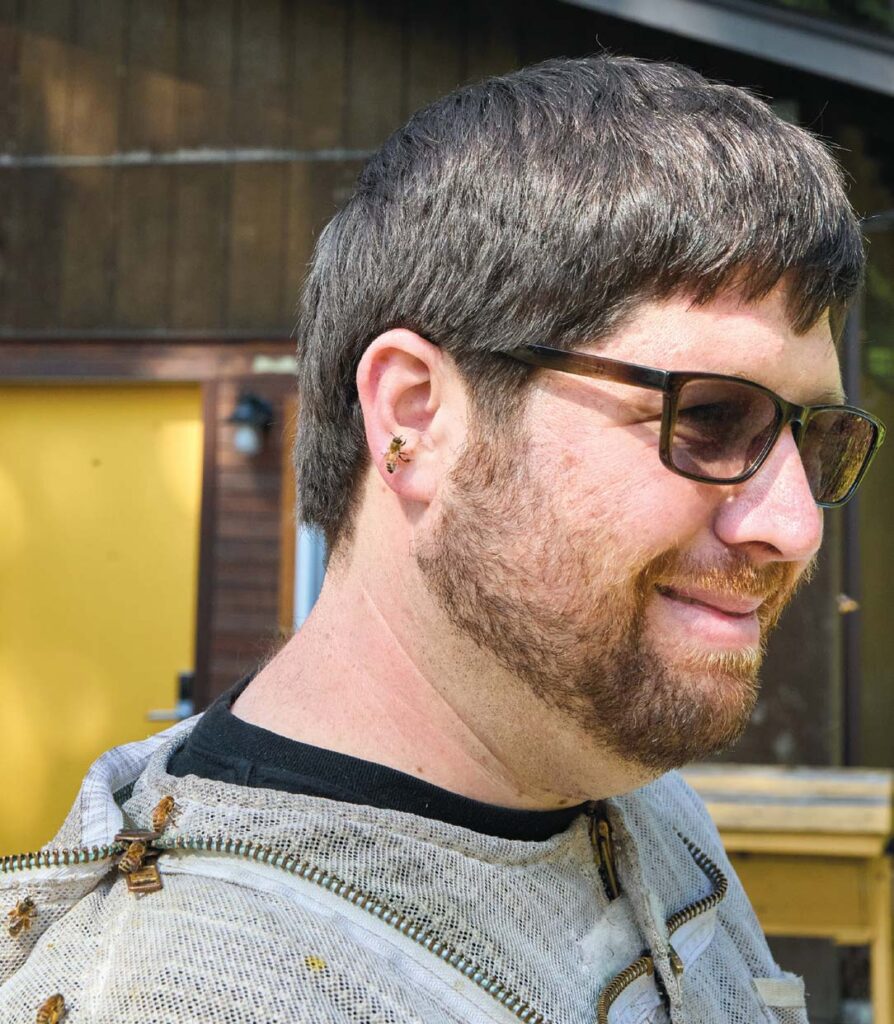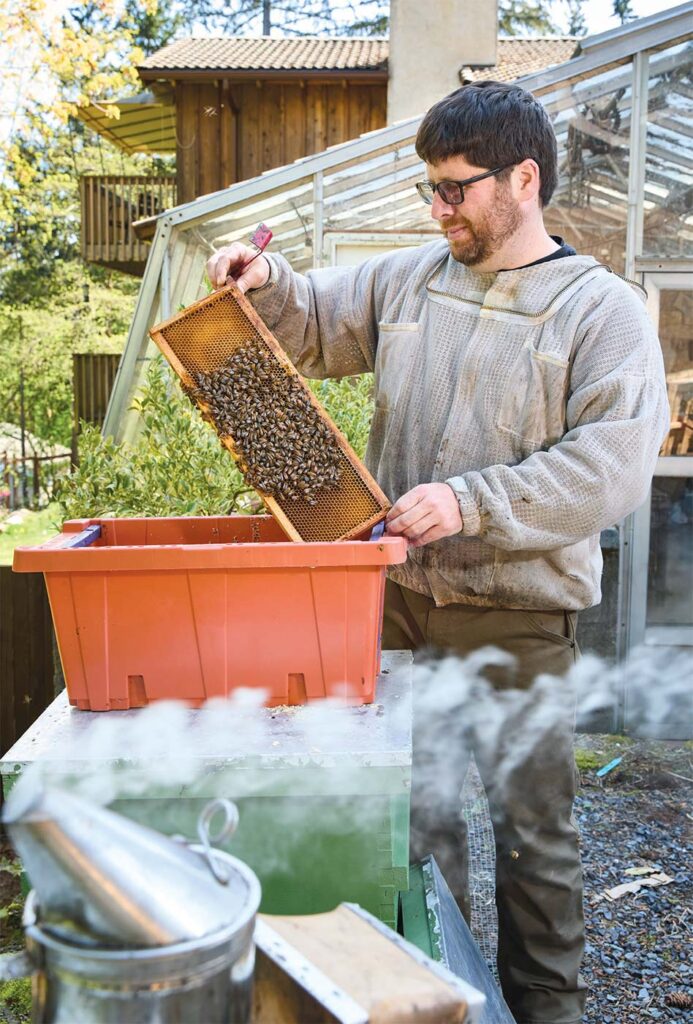
This urban apiary works hard for the honey
IMAGES BY THEODORA TEODOSIADIS
Walking up the driveway to the headquarters of Rainy Day Bees in Shoreline, you don’t hear the bees at all. From the street, it’s simply a lovely house, shaded by trees, tucked away from main roads. But come upon the large greenhouse attached to the house, you’ll see the hives—and hear them. The warmer weather has the bees hard at work, flying to and fro, collecting pollen and nectar to bring back to their hives, and the whole scene has a low, comforting hum. With the sun shining on the hives, the air smells faintly of warmed honey.
“I had always liked social insects,” says Peter Nolte, who owns Rainy Day Bees with his wife, Amy Beth Nolte. “Eighth grade was when we were at the Puyallup fair as a family, and a beekeeper told me—‘Oh, you can have bees in the city.’ So that was probably when I first got interested, when that first felt like a possibility.”
He started with a gifted hive that a friend in Phinney Ridge hosted in their backyard, and now more than 14 years on, the Noltes are all about backyard bees. Rainy Day Bees was founded in 2014, and is most well-known for its hyperlocal raw honeys. Some are specific to the flowers and crops the bees have foraged from, like fireweed or blackberry blossom—others harvested by neighborhood, which is where things can get interesting.
“The bees can forage between two and six miles around their home base,” says Amy Beth. “So obviously our residential hive hosts get more pollination in their yards, but the bees are all over. And that’s the magic around the neighborhood-specific honey, is that the bees are all around. People in the neighborhoods feel real ownership of the bees.”
The Noltes and their beekeeping staff spend swarm season, usually March through June, checking on their hives all over Seattle on a weekly basis, sometimes more often to prevent swarms and keep the bees happy and healthy.

“Bees are a superorganism, and if the superorganism dies, that’s the end of the colony’s genetics. So spring is when they have the most time to create a new colony, and have the best chance of surviving the next winter… No single bee can survive by itself.” —Peter Nolte
Hardworking honey bees zoom around the hives at Rainy Day Bees in Shoreline.
“Bees are a superorganism, and if the superorganism dies, that’s the end of the colony’s genetics. So spring is when they have the most time to create a new colony, and have the best chance of surviving the next winter,” Peter says. “So in the spring, the superorganism naturally divides itself in half, like an amoeba, and half of the bees fly away with the old queen to go find a new home. The other half stay in the hive, finish raising a new queen and continue the life of the original colony. No single bee can survive by itself.”
Preventing the bees from swarming can require some subtle persuasion on the parts of the beekeepers—convincing the bees they’ve already swarmed by manually splitting colonies, and other techniques that keep half your honeybees from flying off without you—and keeping their honey all for themselves.
The Noltes have planted many native plants over the years in conjunction with their hives, and encourage their hive hosts to do the same, but admit some of the fun is in the wide variety of plants the bees pull pollen and nectar from, which ultimately informs the flavor of the finished honey.
“Our favorite honey we ever produced was I think in our second year of beekeeping,” says Amy Beth. “It was in one of our hives in Phinney, and it got some crazy, late-season Mediterranean herb flow. It was this dark, complex, amazing honey. And with the backyard hives, you get surprises like that.”
Over the years, the Noltes have slowly grown their operation. They took on a couple employees, and added to their equipment. This year, they were able to purchase vehicles for beekeeping staff to use. A recent Washington State Department of Agriculture grant allowed them to get a new labeling machine, honey harvesting equipment, and equipment to freeze-dry bee pollen.
“We’ve been selling it frozen, but we’ve bought a ton of pollen traps, and it will be freeze-dried now, so it’s shelf stable. Pollen isn’t as reliant on the weather, meaning if there’s a lot of rain, or if it’s super dry, it’s another way we can stay stable.”
Stability can be a hard thing to find. Peter remembered that in 2016, the spring and summer were unusually hot and dry, meaning less nectar, meaning less honey. He had just moved to working full time with the bees, and they had made a large investment in scaling up to around 60 hives. The reduced honey crop was a hard pill to swallow.
“People said, ‘Well, that was a weird year, but it’s your first one,’” says Peter. He’s installing a nucleus hive in the teaching apiary as he talks, inspecting frames of bees as they go about their work before installing them in a full size hive. In just a few minutes, Peter is able to assess the health and production of the bees by sight alone, keeping them ahead of any potential pitfalls.

“We feel more strongly about giving people more context and connection to bees and pollinators. To us, what’s good for honeybees is good for native bees, is good for honeybees, is good for native bees, right? We should all be planting more flowers.” —Amy Beth Nolte

Amy Beth laughs, adding, “Right, that was an unpredictable year. And every year since, it’s been ‘a weird year.’ For like a decade now.”
Rainy Day Bees tries to weather the constantly changing conditions of beekeeping—some of which are the normal cost of doing business with a superorganism like bees, and some of which are due to climate change or market changes—by creating a diverse array of products and services. They teach classes, host events and keep corporate and residential hives, as well as hives on local farms, like Jubilee Farm in Carnation, or in rural forests. They have classic raw honeys, and also incredibly popular products like their Nordic Spice Creamed Honey, Honey Cocoa and classic creamed honey, but also carry products like bee pollen, and handmade beeswax candles.
Through another grant, they were able to work with a business strategy consultant and a marketing consultant, both of whom suggested they may be doing too many things to remain sustainable. After working with them, the consultants changed their tune. “At the end of it, they’re like ‘You’re actually really well diversified to mitigate the risks of farming,’” Amy Beth says. “Well, we’ve had to be! This is where we are.”
They work on staying flexible, and taking on new opportunities as they arise. This past winter, Peter took their hives south to California to help with pollination in the almond fields. Almonds are one of California’s top agricultural exports. It wasn’t easy for the Noltes to decide to participate.
“It was a complicated decision for us,” says Amy Beth. “The goal was to learn, but it is part of Big Ag[riculture]. Should California have so many almond trees? Maybe not, but does almost the entire beekeeping industry depend on pollination? Yes.”
There were added benefits, like learning about larger scale techniques for keeping bees and utilizing hives. Rainy Day’s bees also got a jump on the season, growing bigger and stronger in the California sunshine, while Seattle was still deep in the throes of cool, wet springtime weather, which with the added learning opportunity, seemed like a pretty good deal.
Each new year brings new opportunities and challenges for Rainy Day, but Peter and Amy Beth meet both with a similar cheerfulness. Though Amy Beth works a full-time job for an accounting firm, the couple work constantly to make Rainy Day Bees stronger and more independent. It can be difficult to keep moving forward, especially when controversy crops up, like debates about resource competition between honeybees and native bees. The phenomenon known as “colony collapse disorder” notwithstanding, several invertebrate conservationists have cited honeybees as a possible reason native bees also appear to be struggling.
The Noltes think the issue is a lot more nuanced, but it cost Rainy Day and many other beekeepers access to honey flows on federal lands while the science on competition between bee species was even more opaque than it is today. Even a recent review of pollinator competition studies, done by Oregon State University in May, found that results were nearly split down the middle on positive or negative effects of honeybees on native bees. The general consensus of the review was that more habitat and less chemicals (like pesticides) would be the most beneficial to all pollinator species.
“The magic around the neighborhood-specific honey is that the bees are all around. People in the neighborhoods feel real ownership of the bees.” —Amy Beth Nolte
“I’m more cautious now,” says Amy Beth. “It’s sad that [tension] is there at all. We feel more strongly about giving people more context and connection to bees and pollinators. To us, what’s good for honeybees is good for native bees, is good for honeybees, is good for native bees, right? We should all be planting more flowers.”
To that end, they spend a lot of time trying to educate people about not just their honeybees and other pollinators, but also the effects of harmful weed killers and invasive plants. One of these, Himalayan Blackberry, is very commonly pollinated by honeybees, but notoriously invasive. Peter says while as beekeepers they like the blackberry blossom honey, they also realize the effects of such a pervasive non-native plant. They recently launched a new honey flight, a trio of native wildflower honeys—fireweed, snowberry and meadowfoam. The trio is actually a collaboration with a few PNW beekeepers. It’s a good chance to spread some love for native plants, while also enjoying some really good honey.
Their hard work is paying off in other ways too. This year, Rainy Day Bees received a Snail of Approval award from Slow Food Seattle, an organization celebrating people in Puget Sound who are working towards a more sustainable and just food system. They’re also working on opening a retail space, where folks can find their honey and other products outside of farmers market hours.
“For us, it’s not an either-or conversation,” says Amy Beth. “Our world is complicated, and we want to have these conversations about what is right and what’s sustainable. All pollination is so important. We might not change the world, but we can do our thing—we can offer amazing employment in a really cool job to our beekeepers, and we can bring bees to people’s backyards where they get to watch and wonder at them. Spending that time, even just sitting and being present with the natural world—and if we can get people much better tasting honey too? It’s another thing we can use to connect.”
RAINY DAY BEES
1240 NE 175th Street, Suite B
Shoreline, WA 98155
Opening soon!
rainydaybees.com
